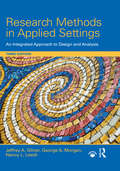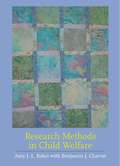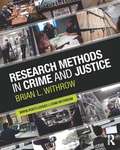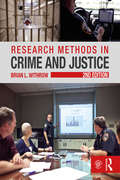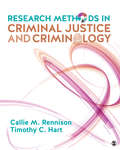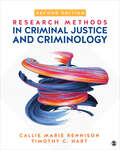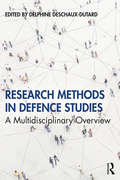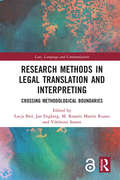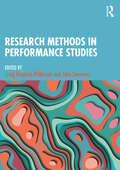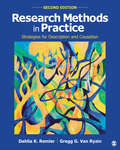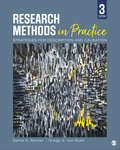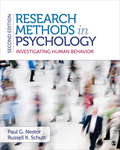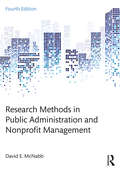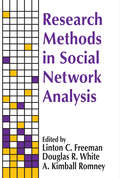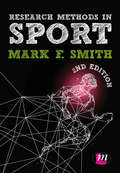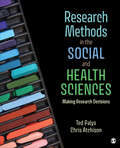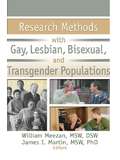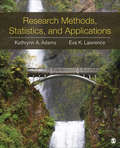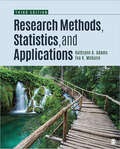- Table View
- List View
Research Methods in Applied Settings: An Integrated Approach to Design and Analysis, Third Edition
by George A. Morgan Jeffrey A. Gliner Nancy L. LeechThis text teaches readers how to plan, conduct, and write a research project and select and interpret data through its integrated approach to quantitative research methods. Although not a statistics book, students learn to master which technique to use when and how to analyze and interpret results, making them better consumers of research. Organized around the steps of conducting a research project, this book is ideal for those who need to analyze journal articles. With teaching experience in various departments, the authors know how to address the research problems faced by behavioral and social sciences students. Independent sections and chapters can be read in any order allowing for flexibility in assigning topics. Adopters applaud the book’s clarity and applied interdependent approach to research. The book emphasizes five research approaches: randomized experimental, quasi-experimental, comparative, associational, and descriptive. These five approaches lead to three kinds of research designs which lead to three groups of statistics with the same names. This consistent framework increases comprehension while avoiding confusion caused by inconsistent terminology. Numerous examples, diagrams, tables, key terms, key distinctions, summaries, applied problems, interpretation questions, and suggested readings further promote understanding. This extensively revised edition features: More examples from published research articles to help readers better understand the research process. New Research in the Real World boxes that highlight actual research projects from various disciplines. Defined key terms in the margins and interpretation questions that help readers review the material. More detailed explanations of key concepts including reliability, validity, estimation, ethical and bias concerns, data security and assumptions, power analysis , and multiple and logistic regression. New sections on mediation and moderation analysis to address the latest techniques. More coverage of quasi-experimental design and qualitative research to reflect changing practices. A new appendix on how to write about results using APA guidelines to help new researchers. Online resources available at www.routledge.com/9781138852976 that provide instructors with PowerPoints, test questions, critical thinking exercises, a conversion guide, and answers to all of the book’s problems and questions. Students will find learning objectives, annotated links to further readings and key concepts, and key terms with links to definitions. Intended for graduate research methods or design or quantitative/experimental research methods courses in psychology, education, human development, family studies, and other behavioral, social, and health sciences, some exposure to statistics and research methods is recommended.
Research Methods in Child Welfare
by Amy J. Baker Benjamin CharvatSocial service agencies are facing the same expectations in quality management and outcomes as private companies, compelling staff members and researchers to provide and interpret valid and useful research to stakeholders at all levels in the field. Child welfare agencies are particularly scrutinized. In this textbook, two highly experienced researchers offer the best techniques for conducting sound research in the field. Covering not only the methodological challenges but also the real-life constraints of research in child welfare settings, Amy J. L. Baker and Benjamin J. Charvat present a volume that can be used both for general research methods and as a practical guide for conducting research in the field of child welfare. Baker and Charvat devote an entire chapter to ethical issues involved in researching children and their families and the limits of confidentiality within this population. They weave a discussion of ethics throughout the book, and each chapter begins with a scenario that presents a question or problem to work through, enabling readers to fully grasp the methods in the context of a specific setting or area of concern. Special sections concentrate on the value of continuous quality-improvement activities, which enable the collection and analysis of data outside of the strictures of publishable research, and the implementation of program evaluations, which can be helpful in obtaining further research and programmatic funding.
Research Methods in Conflict Settings
by Dyan Mazurana Karen Jacobsen Lacey Andrews Gale Dyan Mazurana Karen JacobsenIncreasing numbers of researchers are now working in regions experiencing high levels of conflict or crisis, or among populations that have fled violent conflict to become refugees or internally displaced persons. Understanding these conflicts and their aftermath should be shaped not only by the victors and their elite companions but also by the local people whose daily lives become intertwined with the conflict - and it is this "view from below" that this volume's authors seek to share. Yet conducting rigorous research in these kinds of field contexts presents a range of ethical, methodological, logistical, and security challenges not usually confronted in non-conflict field contexts. This volume compiles a rich variety of lessons learned by experienced field researchers, many of whom have faced demanding situations characterized by violence, profound and well-grounded distrust, and social fragmentation. The authors' offer options, ideas, and techniques for studying the situations of people affected by conflict and, by focusing on ethical and security issues, seek ways to safeguard the interests and integrity of the research "subjects" and of the researchers and their teams.
Research Methods in Crime and Justice
by Brian L. WithrowThis fresh and innovative hybrid text/online material for undergraduate CJ RESEARCH METHODS uniquely addresses the fundamental teaching issue for this course: how to communicate and successfully teach students that their future success as criminal justice practitioners is linked to their acquisition of research skills. The author Brian Withrow, a former Texas State Trooper, widely published academic researcher, and teacher of the undergraduate methods course, consistently demonstrates how research skills aren't just essential to university academic researchers; they are essential to student success as criminal justice practitioners, and to all who want to succeed in an information economy. More than 80 short, sharply focused examples throughout the text rely on actual research that is conducted by, on behalf of, or relevant to criminal justice practitioners. The book engages students' interests like no other.The online materials provide a wide array of instructor support material, all written by the author, and also offer a unique feature, The Researcher's Notebook, which provides students (and their instructors) a series of structured exercises leading to the development and completion of a research question, conducting a literature review, and designing a research method that provides the data necessary to answer the research question - all with a minimal amount of instructor supervision. Cover images are courtesy of Lauren Withrow
Research Methods in Crime and Justice (Criminology and Justice Studies)
by Brian L. Withrow<p>Research Methods in Crime and Justice, 2nd Edition, is an innovative text/online hybrid for undergraduate Criminal Justice Research Methods courses. This material uniquely addresses the fundamental teaching issue for this course: how to show students that success as criminal justice practitioners is linked to their acquisition of research skills. Brian Withrow, a widely published academic researcher and former Texas State Trooper, developed this approach for his own undergraduate Research Methods class. He persuasively demonstrates that research skills aren’t just essential to university academic researchers but to successful criminal justice practitioners as well. <p>More than 80 short, sharply focused examples throughout the text rely on research that is conducted by, on behalf of, or relevant to criminal justice practitioners to engage students’ interest like no other text of its kind. Extensive web materials all written by the author provide an array of instructor support material, including a Researcher’s Notebook that provides students (and their instructors) with a series of structured exercises leading to the development of a valid research project. Withrow systematically walks students through defining a question, conducting a literature review, and designing a research method that provides the data necessary to answer the research question—all online, with minimal instructor supervision. <p>The second edition features expanded coverage of measurement, qualitative research methods, and evaluation research methods, as well as additional downloadable journal articles to ensure students begin to think critically about research and can read scholarly literature.</p>
Research Methods in Criminal Justice and Criminology
by Callie Marie Rennison Timothy Christopher HartResearch Methods in Criminal Justice and Criminology connects key concepts to real field research and practices using contemporary examples and recurring case studies that demonstrate how concepts relate to your life. Authors Callie M. Rennison and Timothy C. Hart introduce practical research strategies used in criminal justice to show you how a research question can become a policy that changes or influences criminal justice practices. The book’s student-driven approach addresses both the why and the how as it covers the research process and focuses on the practical application of data collection and analysis. By demonstrating the variety of ways research can be used and reinforcing the need to discern quality research, the book prepares you to become a critical consumer and ethical producer of research.
Research Methods in Criminal Justice and Criminology
by Callie Marie Rennison Timothy Christopher HartResearch Methods in Criminal Justice and Criminology connects key concepts to real field research and practices using contemporary examples and recurring case studies that demonstrate how concepts relate to your life. Authors Callie M. Rennison and Timothy C. Hart introduce practical research strategies used in criminal justice to show you how a research question can become a policy that changes or influences criminal justice practices. The book’s student-driven approach addresses both the why and the how as it covers the research process and focuses on the practical application of data collection and analysis. By demonstrating the variety of ways research can be used and reinforcing the need to discern quality research, the book prepares you to become a critical consumer and ethical producer of research.
Research Methods in Criminal Justice and Criminology
by Callie Marie Rennison Timothy Christopher HartResearch Methods in Criminal Justice and Criminology connects key concepts to real field research and practices using contemporary examples and recurring case studies throughout the book that demonstrate how concepts relate to students’ lives. Authors Callie M. Rennison and Timothy C. Hart introduce practical research strategies used in criminal justice to show students how a research question can become a policy that changes or influences criminal justice practices. The book’s student-driven approach addresses both the why and the how as it covers the research process and focuses on the practical application of data collection and analysis. By demonstrating the variety of ways research can be used and reinforcing the need to discern quality research, the book prepares students to become critical consumers and ethical producers of research. The Second Edition includes two new case studies woven throughout and new expert profiles to highlight contemporary topics.
Research Methods in Criminal Justice and Criminology
by Callie Marie Rennison Timothy Christopher HartResearch Methods in Criminal Justice and Criminology connects key concepts to real field research and practices using contemporary examples and recurring case studies throughout the book that demonstrate how concepts relate to students’ lives. Authors Callie M. Rennison and Timothy C. Hart introduce practical research strategies used in criminal justice to show students how a research question can become a policy that changes or influences criminal justice practices. The book’s student-driven approach addresses both the why and the how as it covers the research process and focuses on the practical application of data collection and analysis. By demonstrating the variety of ways research can be used and reinforcing the need to discern quality research, the book prepares students to become critical consumers and ethical producers of research. The Second Edition includes two new case studies woven throughout and new expert profiles to highlight contemporary topics.
Research Methods in Defence Studies: A Multidisciplinary Overview
by Delphine Deschaux-DutardThis textbook provides an overview of qualitive and quantitative methods used in different social sciences to investigate defence issues.Recently, defence issues have become of increasing interest to researchers in the social sciences, but they raise specific methodological questions. This volume intends to fill a gap in the literature on defence studies by addressing a number of topics not dealt with sufficiently before. The contributors offer a range of methodological reflections and tools from various social sciences (political science, sociology, geography, history, economics and public law) for researching defence issues. They also address the increasingly important question of data and digitalization. The book introduces the added value of quantitative and qualitative methods, and calls for a cross-fertilization of methods in order to facilitate better research on defence topics and to fully grasp the complexity of defence in the 21st century.This book will be of much interest to students, researchers and practitioners of defence studies, war studies, military studies, and social science research methods in general.
Research Methods in Legal Translation and Interpreting: Crossing Methodological Boundaries (Law, Language and Communication)
by Łucja Biel Vilelmini Sosoni Jan Engberg Rosario Martín RuanoThe field of legal translation and interpreting has strongly expanded over recent years. As it has developed into an independent branch of Translation Studies, this book advocates for a substantiated discussion of methods and methodology, as well as knowledge about the variety of approaches actually applied in the field. It is argued that, complex and multifaceted as it is, legal translation calls for research that might cross boundaries across research approaches and disciplines in order to shed light on the many facets of this social practice. The volume addresses the challenge of methodological consolidation, triangulation and refinement. The work presents examples of the variety of theoretical approaches which have been developed in the discipline and of the methodological sophistication which is currently being called for. In this regard, by combining different perspectives, they expand our understanding of the roles played by legal translators and interpreters, who emerge as linguistic and intercultural mediators dealing with a rich variety of legal texts; as knowledge communicators and as builders of specialised knowledge; as social agents performing a socially situated activity; as decision-makers and agents subject to and redefining power relations, and as political actors shaping legal cultures and negotiating cultural identities, as well as their own professional identity.
Research Methods in Performance Studies
by Craig Gingrich-Philbrook Jake SimmonsResearch Methods in Performance Studies offers a unique approach for readers to engage with performance research and methods in practice. It examines ways of making performance, researching performance cultures, researching performers who themselves are engaged in research, and conducting research in the context of enduring and emergent themes of performance studies inquiry. This book features the work of eighteen scholar-artists currently working in performance studies who demonstrate—through applied projects—various methods for conducting performance research. The result is a wide array of novel scholarship including activist performance, slam poetry, video performance, stand-up comedy, adaptation for the Broadway stage, naturecultural performance, intersectional performance, performances of cultural and material preservation, and many others. Faculty, undergraduate and graduate students, and performance practitioners alike will benefit from the approaches to performance studies research methods articulated by the scholar-artists featured in this collection.
Research Methods in Practice: Strategies for Description and Causation
by Dahlia K. Remler Gregg G. Van RyzinThe Second Edition of Research Methods in Practice: Strategies for Description and Causation sets an entirely new standard for presenting and learning research methods. The perspective gained from this text makes it a truly necessary tool for such applied disciplines as public affairs and administration, public policy, psychology, urban affairs, education, sociology, social work, business, public health, political science, economics, communications and criminal justice. Imbued with a deep commitment to make social and policy research methods accessible and meaningful, the Second Edition of Research Methods in Practice: Strategies for Description and Causation compels and inspires students to truly grasp the logic—and limits—of the latest research appearing in academic journals, government reports, and the media. Authors Dahlia K. Remler and Gregg G. Van Ryzin cover the most pertinent issues and methods, emphasizing the critical interpretation and practical application of research findings. Both causation and description—and the distinction between them—are emphasized and maintained thematically throughout the text. Concepts are taught through in-depth examples, such as “Fighting Malaria in Kenya,” “The U.S. Poverty Measure,” “The Fallout from Hurricane Katrina,” “Family Dinners and Teenage Substance Abuse,” and “The Effect of Poverty on Mental Health.” The realistic trade-offs, uncertainties, habits, and excitement of the research experience come through on every page. “This is the best text available for teaching students the fundamentals of research design and statistics, and for introducing them to the difficulties inherent in evaluation research and causal inference.” —Dave E. Marcotte, University of Maryland, Baltimore County
Research Methods in Practice: Strategies for Description and Causation
by Dahlia K. Remler Gregg G. Van RyzinThoroughly updated to reflect changes in both research and methods, this Third Edition of Remler and Van Ryzin’s innovative, standard-setting text is imbued with a deep commitment to making social and policy research methods accessible and meaningful. Research Methods in Practice: Strategies for Description and Causation motivates readers to examine the logic and limits of social science research from academic journals and government reports. A central theme of causation versus description runs through the text, emphasizing the idea that causal research is essential to understanding the origins of social problems and their potential solutions. Readers will find excitement in the research experience as the best hope for improving the world in which we live, while also acknowledging the trade-offs and uncertainties in real-world research.
Research Methods in Practice: Strategies for Description and Causation
by Dahlia K. Remler Gregg G. Van RyzinThoroughly updated to reflect changes in both research and methods, this Third Edition of Remler and Van Ryzin’s innovative, standard-setting text is imbued with a deep commitment to making social and policy research methods accessible and meaningful. Research Methods in Practice: Strategies for Description and Causation motivates readers to examine the logic and limits of social science research from academic journals and government reports. A central theme of causation versus description runs through the text, emphasizing the idea that causal research is essential to understanding the origins of social problems and their potential solutions. Readers will find excitement in the research experience as the best hope for improving the world in which we live, while also acknowledging the trade-offs and uncertainties in real-world research.
Research Methods in Psychology: Investigating Human Behavior
by Russell K. Schutt Paul G. NestorThe Second Edition of Paul G. Nestor and Russell K. Schutt’s successful and unique Research Methods in Psychology: Investigating Human Behavior draws from substantive research stories to illustrate how research is presented while systematically unifying the entire research process within a conceptual framework. This accessible text examines engaging research studies and examples, considering research ethics throughout. “This is a great text that emphasizes the important concepts within research methods. The resources are excellent; they incorporate up-to-date research and technology and introduce the student to empirical articles, and the information is presented in a way that challenges the student to apply the material.” —Maria Pacella, Kent State University “The text is comprehensive. It covers a wide variety of information without being overwhelming. This is a very good textbook for an introductory course in research methods. I like that its focus is on psychological research specifically.” —Angela M. Heads, Prairie View A&M University
Research Methods in Public Administration and Nonprofit Management
by David E. McNabbNow in a thoroughly revised and refreshed fourth edition, Research Methods in Public Administration and Nonprofit Management is beloved by students and professors alike for its exceptional clarity and accessibility and plentiful illustrations. This new edition integrates quantitative, qualitative, and mixed-methods approaches, as well as specific up-to-date instruction in the use of statistical software programs such as Excel and SPSS. Changes to this edition include: A new section, featuring two new chapters, to explore mixed-methods approaches to research, including fundamentals, research design, data collection, and analyzing and interpreting findings A new, dedicated chapter on Big Data research Updated exhibits and examples throughout the book A new companion website to accompany the book containing PowerPoint slides for each chapter New exhibits, tables, figures, and exercises, as well as key terms and discussion questions at the end of each chapter Research Methods in Public Administration and Nonprofit Management, 4e is an ideal textbook for use in all research methods courses in undergraduate and graduate public administration, public affairs, and nonprofit management courses.
Research Methods in Social Network Analysis
by A. Kimball Romney Linton C. Freeman Douglas R. WhiteSince the publication of Herbert Spencer's Principles of Sociology in 1875, the use of social structure as a defining concept has produced a large body of creative speculations, insights, and intuitions about social life. However, writers in this tradition do not always provide the sorts of formal definitons and propositions that are the building blocks of modern social research. In its broad-ranging examination of the kind of data that form the basis for the systematic study of social structure, Research Methods in Social Network Analysis marks a significant methodological advance in network studies.As used in this volume, social structure refers to a bundle of intuitive natural language ideas and concepts about patterning in social relationships among people. In contrast, social networks is used to refer to a collection of precise analytic and methodological concepts and procedures that facilitate the collection of data and the systematic study of such patterning. Accordingly, the book's five sections are arranged to address analytical problems in a series of logically ordered stages or processes.The major contributors define the fundamental modes by which social structural phenomena are to be represented; how boundaries to a social structure are set; how the relations of a network are measured in terms of structure and content; the ways in which the relational structure of a network affects system actors; and how actors within a social network are clustered into cliques or groups. The chapters in the last section build on solutions to problems proposed in the previous sections. This highly unified approach to research design combined with a representative diversity of viewpoints makes Research Methods in Social Network Analysis a state-of-the-art volume.
Research Methods in Sport (Active Learning in Sport Series)
by Mark SmithPacked full of essential tools and tips, this second edition is your quick-start guide to undertaking research within real world of sport. Using clear, accessible language, Smith maps an easy-to-follow journey through the research process, drawing upon the most up-to-date evidence and resources to help you select the most appropriate research approach for your project. Throughout the book you will discover: Key points that highlight important definitions and theories; Reflection points to help you make connections between key concepts and your research; Learning activities to put your newfound knowledge into practice; Further reading to explore the wider context of sport research in the real world. Featuring over thirty-five case studies of students’ and academics’ research in practice, this book is the perfect guide-by-your-side to have during your own sport research.
Research Methods in the Social Sciences (Seventh Edition)
by Chava Frankfort-Nachmias David NachmiasResearch Methods in the Social Sciences offer a comprehensive, systematic presentation of the scientific approach within the context of the social sciences. The text, together with the supporting materials, will help readers move through the major stages of the research process.
Research Methods in the Social and Health Sciences: Making Research Decisions
by Ted Palys Chris AtchisonResearch Methods in the Social and Health Sciences: Research Decisions, by Ted Palys and Chris Atchison, gives students a thorough, thoughtful, and highly readable introduction to the entire research process from start to finish. From its underlying premise that your research questions and objectives, rather than any specific method, should guide your research, this book discusses each step of the research process, from limiting the scope of a literature review to navigating ethical considerations to deciding which methods are best suited for finding answers to specific research questions to how to analyze data and present findings. Readers are encouraged to think deeply about each step of the research process. The book promotes this deliberation by discussing the strengths and limitations of different methods and. Throughout the process, the authors provide many examples from their own and student research, sharing insights for research decisions arising from that experience. Readers will develop the skills to create solid research questions, perform literature reviews, identify appropriate data sources and methods, conduct research, analyze and interpret data and translate the resulting knowledge generated from the research process to a wider audience– all core parts of the research process –by developing their knowledge and creating confidence in their own decision-making skills. After explaining the unique and often complementary strengths of qualitative and quantitative methods, students focus on what methods are best suited for finding answers to the research questions that interest them. Major types of research including experiments, case studies, surveys, quasi-experiments, ethnographies, focus groups, participatory action research, and archival studies all receive significant coverage. The text illustrates how these methods are enhanced by integrating them with 21st century technologies and combining them in mixed methods projects. Chapters on constructing a research proposal and disseminating research bookend the process with concrete steps in between to support students designing their own original research projects. Study questions at the end of each chapter encourage students to think critically about the research process and how the choices a researcher makes will broaden or constrain what they can find. By the end of the text, social and health science students will feel confident in undertaking ethical and thoughtful research.
Research Methods in the Social and Health Sciences: Making Research Decisions
by Ted Palys Chris AtchisonResearch Methods in the Social and Health Sciences: Research Decisions, by Ted Palys and Chris Atchison, gives students a thorough, thoughtful, and highly readable introduction to the entire research process from start to finish. From its underlying premise that your research questions and objectives, rather than any specific method, should guide your research, this book discusses each step of the research process, from limiting the scope of a literature review to navigating ethical considerations to deciding which methods are best suited for finding answers to specific research questions to how to analyze data and present findings. Readers are encouraged to think deeply about each step of the research process. The book promotes this deliberation by discussing the strengths and limitations of different methods and. Throughout the process, the authors provide many examples from their own and student research, sharing insights for research decisions arising from that experience. Readers will develop the skills to create solid research questions, perform literature reviews, identify appropriate data sources and methods, conduct research, analyze and interpret data and translate the resulting knowledge generated from the research process to a wider audience– all core parts of the research process –by developing their knowledge and creating confidence in their own decision-making skills. After explaining the unique and often complementary strengths of qualitative and quantitative methods, students focus on what methods are best suited for finding answers to the research questions that interest them. Major types of research including experiments, case studies, surveys, quasi-experiments, ethnographies, focus groups, participatory action research, and archival studies all receive significant coverage. The text illustrates how these methods are enhanced by integrating them with 21st century technologies and combining them in mixed methods projects. Chapters on constructing a research proposal and disseminating research bookend the process with concrete steps in between to support students designing their own original research projects. Study questions at the end of each chapter encourage students to think critically about the research process and how the choices a researcher makes will broaden or constrain what they can find. By the end of the text, social and health science students will feel confident in undertaking ethical and thoughtful research.
Research Methods with Gay, Lesbian, Bisexual, and Transgender Populations
by William Meezan James I. MartinTake an in-depth look at what works-and what doesn't-in research with GLBT populations! This essential book examines the usefulness of current frameworks for research with GLBT populations and highlights the necessity for greater complexity in the conceptualization and design of research with these populations. It will help you understand the need for more inclusive and representative samples and the need to protect the privacy of GLBT research participants-and ways to accomplish these goals. In addition, Research Methods with Gay, Lesbian, Bisexual, and Transgender Populations considers the advantages and limitations of having an "inside" perspective when conducting research with these populations. It also explores the myriad ways in which this research can be used to better understand issues facing GLBT communities. Specifically, Research Methods with Gay, Lesbian, Bisexual, and Transgender Populations discusses: eight strategies that "outsiders" can use to overcome barriers to doing their work the challenges of finding and studying older members of gay and lesbian communities the special challenges that studying gay drug users pose to the researcher factors affecting research with urban Black and African-American GLBT populations sampling issues, including ways to overcome the challenges of conducting research with sexual minority adolescents, issues related to dealing with institutional review boards, and lessons derived from empirical articles in the Journal of Gay & Lesbian Social Services unique features of AIDS service organizations to consider when developing an evaluation strategy ethical standards for research and evaluation with GLBT populations and a great deal more! From the Foreword, by Anthony R. D'Augelli: "In social science research, the effort to extract durable principles of social causality from the apparent randomness of everyday life requires the construction of reliable, if tentative, knowledge that is significantly more informative than mere speculation. With our ever-increasing knowledge base, increasingly sophisticated and powerful quantitative and qualitative methodologies, and with an ever-expanding cadre of researchers, our ability to discern patterns of development of GLBT people from birth to death, the unique qualities of their relationships, and the impact of communities and cultures on the ways in which their sexualities are manifested, will come into sharper focus. In this way, research becomes a tool by which GLBT people transcend invisibility and marginalization. As new research accumulates, the unique contributions that GLBT lives make to our understanding of the nature of human development will be documented in ways never before thought possible. "Within the larger context of social science research on GLBT populations, this book describes the current status of social service researchers in their quest for methodological sophistication and conceptual complexity. The work of the contributors to this volume exemplifies the progress that has been made since the first research reports on this topic were published."
Research Methods, Statistics, and Applications
by Kathrynn A. Adams Eva K. LawrenceResearch Methods, Statistics, and Applications, by Kathrynn A. Adams and Eva K. Lawrence, is designed to introduce students to conducting and analyzing research. This engaging book consistently integrates research methods and statistics, allowing students to learn concurrently about different research designs and the appropriate statistics to use when analyzing data. Numerous examples and practical applications help readers gain interest in the material while diminishing the anxiety students experience while taking this course. In every chapter, the authors develop and apply research topics and examples from the current research literature across all aspects of the research process. Using conversational language, the text prepares students for both graduate work and for critical analysis of research as professionals and informed citizens.
Research Methods, Statistics, and Applications
by Kathrynn A. Adams Eva Kung McGuire (aka: Lawrence)Research Methods, Statistics, and Applications by Kathrynn A. Adams and Eva K. McGuire is designed to give students the experience of being a researcher by combining the interrelated concepts of research methods and statistics to better explain how the research process incorporates both elements. Employing a conversational tone throughout, coupled with an emphasis on decision-making, this best-selling text will spark students’ interest in conducting research and improve their ability to critically analyze research in their daily lives. The Third Edition includes a new chapter on measurement to better highlight its critical importance, updates for the 7th edition of the Publication Manual of the American Psychological Association, new examples related to social justice, additional sections on qualitative research methods, and more thorough integration of research ethics information and tips throughout each chapter.
